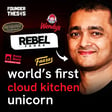
The odyssey of truly becoming a founder | Vinod Singh @ Concirrus
Some founders are born lucky - and some founders are born to fight against tremendous odds and adversities.
This is the story of Vinod Singh who was born in a village in UP which did not even have electricity, and yet through sheer grit and willpower - ended up becoming the CTO of a startup in the UK.
And you might think that this is the happy ending of the story, but like they say - picture abhi baaki hai.
Vinod then started a business that was initially built around leveraging the potential of IOT technology, and which eventually pivoted to selling software to speciality insurance companies. And that was the birth of Concirrus which went on to raise more than $40mn over the next couple of years.
But that is when things fell apart and the founders realised that they had diluted so much of their equity that they no longer had any control over the future of Concirrus and they were on the verge of declaring bankruptcy.
Stay tuned to learn what happened next as your host Akshay Datt speaks to Vinod Singh about his amazing journey as a founder and don’t forget to subscribe to the Founder Thesis podcast.



















